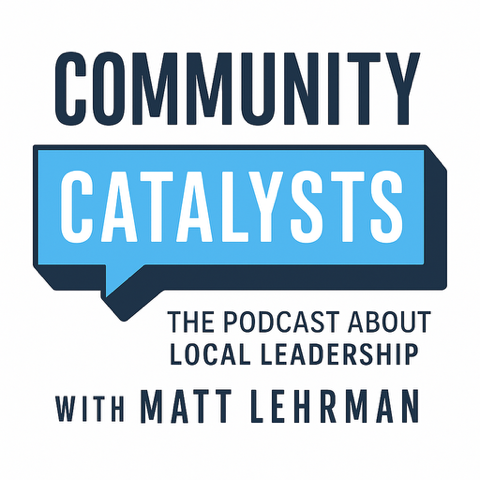When Words Collide
When Words Collide
Last week, local leaders from across the country came together for a 90-minute virtual conversation about the words we use, the values we hold, and the challenges we face. Mayors, council members, and civic officials shared candid insights—not just about policy, but about how everyday language now feels risky, and how they stay grounded in community service.
Local leaders are under growing pressure to lead across lines of division—not only political but linguistic. In Social Prosperity Partners' April Local Leadership Chat, civic leaders from across the country shared how their work is increasingly shaped by public reactions to everyday words. Terms once considered foundational to civic life, like "community," "diversity,” “fairness," or "transparency"—now risk triggering distrust, disengagement, or even outrage.
This month's conversation explored not just what vocabulary has become difficult, but how leaders stay true to their purpose and communicate in ways that promote connection rather than conflict.
When Language Feels Like a Landmine
- "Even well-intended words can spark immediate reactions," one leader reflected. "Before the full meaning is even understood, people are already drawing battle lines."
- Many participants shared that formerly uncontroversial words are now politically loaded. One mayor noted that the word "progressive" once meant forward-thinking and innovative in her town. Now, it's shorthand for a political agenda that many in the community resist. Others pointed to words like "liberal," "conservative," and even "nonpartisan" as lightning rods.
- "I ran as a nonpartisan candidate and got attacked from both sides," one council member explained. "It seems like there’s no safe ground anymore—you're either with one tribe or against it."
- Some phrases have been co-opted entirely. "Stay in our lane," once a reminder to focus on local matters, was rebranded by one official's critics as a call to ignore important social issues. "Transparency," others shared, can now sound disingenuous or defensive.
- Another hot-button term: "affordable housing." "That phrase means five different things to five different groups," a long-serving mayor said. "I stopped using it altogether. Now I just talk about 'housing variety.'"
Reframing Leadership in a Politicized Climate
- The conversation shifted toward how leaders adapt their communication while still holding onto their principles.
- "Some words I sidestep," said one official, "but there are some I won’t give up. 'Nonpartisan' is one. That's what local government is supposed to be. If we lose that, we lose trust."
- Several participants echoed that sentiment: "There isn’t a Republican way to plow the snow or a Democratic way to collect the trash. Government at our level should serve everyone."
- One mayor shared how she centers each council meeting by reminding residents: "We will disagree, but we are required to work together." Another emphasized beginning every meeting by simply saying, "I’m happy to be here with you."
- One word several leaders said they’d never abandon: “We.” "It’s just two letters, but it changes the tone of everything," a mayor reflected. "We can do this together. We are this community. That’s powerful."
Making Government Human Again
- Many leaders said their communities no longer see the city as people. "They say, 'The city did this' or 'The city failed,' as if the city is some faceless bureaucracy," one participant said. "We have to bring the humanity back."
- Several exchanged practical strategies:
- Refer to staff by name in public communications.
- Spotlight department heads or frontline workers in newsletters and videos.
- Explain the "why" behind policies so residents understand intentions, not just procedures.
- "People don't trust policies," one leader said. "They trust people."
Social Media: Risk, Responsibility, and Response
- There was no consensus on social media strategy, but there was a shared experience. One mayor said she took a short Facebook break and returned to find "total chaos" over a policy miscommunication. Others described residents posting false accusations without ever picking up the phone or sending an email.
- "People don’t want to ask. They want to assume," one participant said. "And they want to be angry."
- Strategies varied:
- One mayor created a newsletter-style Facebook group with commenting disabled.
- Another embraced an active Facebook presence, using it to calmly counter misinformation and empower other residents to join the conversation.
- Others warned about Sunshine Law implications and the risk of personal liability.
- "I try to stay educational, not positional," one leader shared. "If I defend every decision, I lose. But if I explain how a policy works, I often gain trust."
Strengthening Connection, One Word at a Time
- At the heart of the discussion was a shared desire to build trust in the face of division. The word "community" emerged again and again as a unifying concept.
- "We need more horizontal conversations, not vertical ones," a mayor said. "Right now, people feel like government is above them. We need to meet them eye to eye."
- Others advocated for:
- Replacing "the city" with "we" in all public messaging
- Beginning meetings with personal gratitude and welcoming language
- Creating rituals that reinforce shared values like fairness, unity, and inclusion
- As one official put it, "Dissent is part of democracy. But respect is too."
Takeaways for Local Leaders Everywhere
- Words matter: Avoid weaponized terms when possible, but don’t abandon your values.
- Lead with "We": Use inclusive language to shift from "us vs. them" to "we're in this together."
- Make it personal: Humanize government by highlighting real people behind the work.
- Model grace: In tense conversations, ask for it, offer it, and show it.
- Protect your peace: Know when to step back from toxic spaces—and when to lean in with purpose.
- Prioritize relationships: Trust is built over time and through connection, not just communication.
- As one mayor summed it up: "We're not just managing cities. We're shaping how people live and work together. And that begins with the words we choose—and the values we refuse to abandon."
Join the Conversation
Local Leadership Chats are hosted monthly by Social Prosperity Partners as a space for elected, appointed, and civic leaders to connect, reflect, and grow. If you're leading in your community and want to engage with peers facing similar challenges, you're warmly invited to join us. Let’s lead better, together.
What’s a topic that you’d be especially interested to discuss with your peers? I’d love to hear your thoughts: Matt@SocialProsperity.us.



